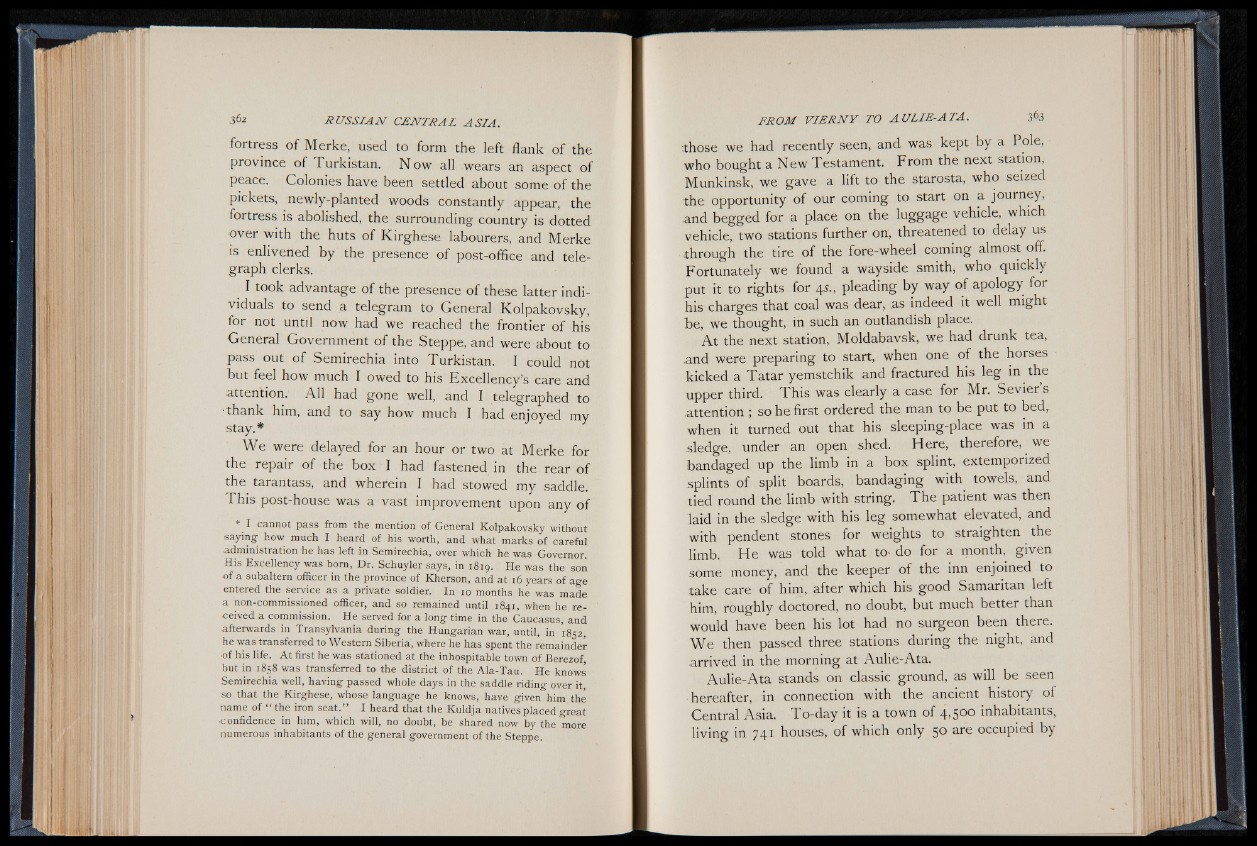
fortress of Merke, used to form the left flank of the
province of Xurkistan. Now all wears an aspect of
peace. Colonies have been settled about some of the
pickets, newly-planted woods constantly appear, the
fortress is abolished, the surrounding country is dotted
over with the huts of Kirghese labourers, and Merke
is enlivened by the presence of post-offlce and telegraph
clerks.
I took advantage of the presence of these latter individuals
to send a telegram to General Kolpakovsky,
for not until now had we reached the frontier of his
General Government of the Steppe, and were about to
pass out of Semirechia into Turkistan. I could not
but feel how much I owed to his Excellency’s care and
attention. All had gone well, and I telegraphed to
■thank him, and to say how much I had enjoyed my
stay.*
We were delayed for an hour or two at Merke for
the repair of the box I had fastened in the rear of
the tarantass, and wherein I had stowed my saddle.
This post-house was a vast improvement upon any of
I cannot pass from the mention of General Kolpakovsky without
saying- how much I heard of his worth, and what marks of careful
administration he has left in Semirechia, over which he was Governor.
His Excellency was born, Dr. Schuyler says, in 1819. He was the son
o f a subaltern officer in the province of Kherson, and at 16 years of age
entered the service as a private soldier. In 10 months he was made
a non-commissioned officer, and so remained until 1841, when he received
a commission. He served for a long time in the Caucasus, and
afterwards in Transylvania during the Hungarian war, until, in 1852,
he was transferred to Western Siberia, where he has spent the remainder
o f his life. A t first he was stationed at the inhospitable town of Berezof
but in 1858 was transferred to the district of the Ala-Tau. He knows
Semirechia well, having passed whole days in the saddle riding over it,
so that the Kirghese, whose language he knows, have given him thé
name of “ the iron seat.” I heard that the Kuldja natives placed great
confidence in him, which will, no doubt, be shared now by the more
numerous inhabitants of the general government of the Steppe.
those we had recently seen, and was kept by a Pole, •
who bought a New Testament. From the next station,
Munkinsk, we gave a lift to the starosta, who seized
the opportunity of our coming to start on a journey,
.and begged for a place on the luggage vehicle, which
vehicle, two stations further on, threatened to delay us
through the tire of the fore-wheel coming almost off.
Fortunately we found a wayside smith, who quickly
put it to rights for 4s., pleading by way of apology for
his charges that coal was dear, .as indeed it well might
be, we thought, in such an outlandish place.
A t the next station, Moldabavsk, we had drunk tea,
,and were preparing to start, when one of the horses
kicked a Tatar yemstchik and fractured his leg in the
upper third. This was clearly a case for Mr. Sevier s
.attention ; so he first ordered the man to be put to bed,,
when it turned out that his sleeping-place was in a
sledge, under an open shed. Here, therefore, we
bandaged up the limb in a box splint, extemporized
splints of split boards, bandaging with towels, and
tied round the limb with string. The patient was then
laid in the sledge with his leg somewhat elevated, and
with pendent stones for weights to straighten the
limb. He was told what to- do for a month, given
some money, and the keeper of the inn enjoined to
take care of him, after which his good Samaritan left
him, roughly doctored, no doubt, but much better than
would have been his lot had no surgeon been there.
W e then passed three stations during the night, and
arrived in the morning at Aulie-Ata.
Aulie-Ata stands on classic ground, as will be seen
hereafter, in connection with the ancient history of
Central Asia. To-day it is a town of 4,500 inhabitants,
living in 741 houses, of which only 50 are occupied by